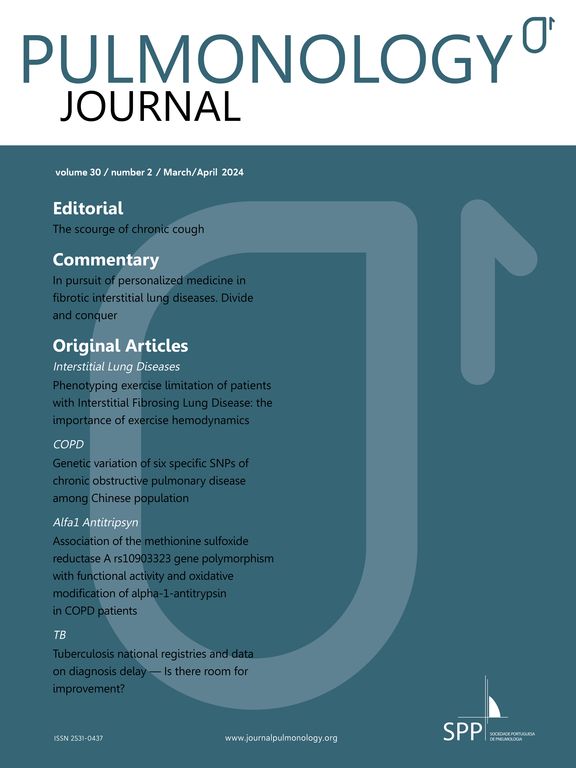I – At the end of the 2010–2012 term, it is both necessary and just that we highlight the many contributions made toward implementing the platform with which this Presidency of the Portuguese Pulmonology Society (SPP, in Portuguese) submitted its candidacy in November 2009.
Firstly, I would stress the internal cohesion and constructive energy of the entire management team, which was capable of developing and executing the implemented strategy in a timely manner. It was extremely motivating to be part of such a close and intellectually stimulating group.
Teamwork facilitates and streamlines procedures, and so in this assessment I would like to underscore the constant availability of the Secretary of the SPP.
For some time, the Working Committees have been the heart and driving force of our Society. This was also the case during this term, with the many excellent activities organized and promoted by these groups, for which we are forever in debt to the respective Coordinators and Secretaries, who are also now leaving their posts.
The revamped editorial structure of the Revista Portuguesa de Pneumologia (RPP) began a new era for this publication, with a new dynamic I believe to be unstoppable. The entire editorial staff has contributed to this quiet revolution, but I could not fail to highlight the visionary role of the Chief and Associate Editors.
And of course the preceding Presidents of the SPP cleared the path, lifting up and consolidating the name of Pulmonology, thus allowing for a continued evolution with solid foundations.
But our success is owed to the members, as well as the friends and even the critics, all of whom are crucial to the renewal we have achieved.
Very little indeed would have been possible without the support of the Pharmaceutical Industry, which will always be associated, on an institutional level, with the development of medical knowledge in the field of pulmonology.
II – Because of this, we were able to contribute to improving the national “Respiratory Environment,” taking into consideration, fundamentally, three areas understood as being strategic and interrelated: the Publishing and Communications component, support for Training, and the Internationalization of our Society, all of which were extensively and openly discussed using innovative brainstorming tactics.
In this regard, the RPP, having achieved the first Impact Factor in 2011, consolidated its supranational trajectory. The Oxigénio newsletter, launched on a significantly revamped website, seeks to contribute to an improved understanding of one another, while promotional activities—fostered, and used, or not, in international campaigns (Flashmob DPOC, World Spirometry Day 2010 and 2012, among others)—contributed to a wider and improved understanding of who we are, both in Portugal and abroad, as we can see from the features on the European Respiratory Society (ERS) and the European Lung Foundation websites.
Recently implemented actions such as Best Trainees, the Thoracic Ultrasound Course (1st SPP official event in Azores), new scholarships in collaboration with industry, and a Fund exclusive to the SPP for Training, Innovation, and Research in Pulmonology, all sought to increase knowledge and training for GPs and pulmonologists. To this end, Interest Groups were also created, together with the Working Committees, spanning several areas of respiratory pathology, while the National Illness Registry was fully launched.
The National Congresses achieved record attendance with over 600 people, providing opportunities to formalize agreements with other Scientific Organizations, such as the Portuguese Cardiology Society, the Portuguese Association of General and Family Medicine, and other institutions. Also during these forums—available for the first time this year via Android and iPhone/iPad—the European Year of the Lung was concluded in 2010, while the 1st Postgraduate ERS/SPP Program was conducted in 2011.
Moreover, collaboration with this Society culminated this year in a diverse and unprecedented Portuguese participation (described in Issue 3 of Oxigénio) in the Annual Congress in Vienna, which also included the formal submission of the candidacy of Lisbon to host an ERS Congress.
Here in Portugal, this year could not have ended any better, with the launch of the National Program for Respiratory Illnesses under the Department of Health.I believe we have upheld our commitment.
III – I hope you will allow me, lastly, to share a more personal anecdote.
During this past term, the field of Pulmonology suffered two tremendous losses. Both the second and third Presidents of the SPP, Professors António Robalo Cordeiro and Manuel Freitas e Costa, decisive and defining figures in our Scientific Society, passed away. I would like to express not only my profound gratitude to my father, to whom I owe everything, but also my sincerest feelings of enormous personal loss.
Love is not stated, it is felt, it is lived, and it is strengthened.
Love is also not shown, and for that, I recall only the way in which you softened the demands of these past years, offering an essential support in overcoming these challenges as peacefully as possible. It is only thus that everything makes sense.
Please cite this article as: Robalo Cordeiro C; O amor não se agradece. Rev Port Pneumol. 2012. http://dx.doi.org/10.1016/j.rppneu.2012.09.001






